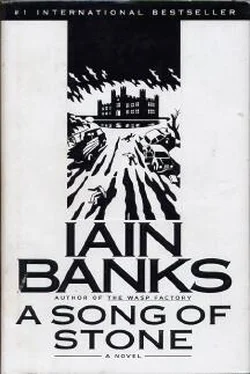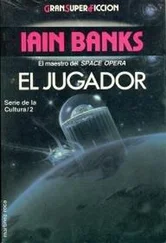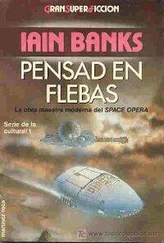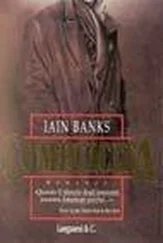Iain Banks - A Song Of Stone
Здесь есть возможность читать онлайн «Iain Banks - A Song Of Stone» весь текст электронной книги совершенно бесплатно (целиком полную версию без сокращений). В некоторых случаях можно слушать аудио, скачать через торрент в формате fb2 и присутствует краткое содержание. Год выпуска: 1997, Жанр: Современная проза, на английском языке. Описание произведения, (предисловие) а так же отзывы посетителей доступны на портале библиотеки ЛибКат.
- Название:A Song Of Stone
- Автор:
- Жанр:
- Год:1997
- ISBN:нет данных
- Рейтинг книги:4 / 5. Голосов: 1
-
Избранное:Добавить в избранное
- Отзывы:
-
Ваша оценка:
- 80
- 1
- 2
- 3
- 4
- 5
A Song Of Stone: краткое содержание, описание и аннотация
Предлагаем к чтению аннотацию, описание, краткое содержание или предисловие (зависит от того, что написал сам автор книги «A Song Of Stone»). Если вы не нашли необходимую информацию о книге — напишите в комментариях, мы постараемся отыскать её.
A Song Of Stone — читать онлайн бесплатно полную книгу (весь текст) целиком
Ниже представлен текст книги, разбитый по страницам. Система сохранения места последней прочитанной страницы, позволяет с удобством читать онлайн бесплатно книгу «A Song Of Stone», без необходимости каждый раз заново искать на чём Вы остановились. Поставьте закладку, и сможете в любой момент перейти на страницу, на которой закончили чтение.
Интервал:
Закладка:
“I'm terribly sorry they're causing a bit of a mess,” the lieutenant says, looking from me to you. She shrugs. “Boys will be boys.”
“So you won't do anything? You won't stop them?” I say. One man is climbing up the side of the great tapestry facing the windows. Outside, in the hall, another is trying to stand on the shoulders of a comrade and grab hold of the chandelier's lowest crystal pendant.
The lieutenant shakes her head. “It's all only possessions, Abel. just stuff. Nothing with a life. just stuff. Sorry.” She takes the bottle from my hand, tops up her glass and hands it back to me. “You'll be needing to go and fetch some wine.” she says, putting the glass back on the sideboard. She reaches for your glass, puts it aside too, then takes your hand. “Shall we dance?” she asks you.
You go with her, led out on to the floor, made way for by the other dancing couples. The fellow climbing the tapestry slips, tearing at it, shouting out as it divides in a great long rend that splits the fabric top to bottom and sends him crashing and laughing into a trolley packed with glasses and plates beneath.
I refill glasses in the dining room and hall, watching the treasures of the castle gradually wither and fragment around me. The rolling noise overhead and crash upon the stairs was a huge ceramic urn, two hundred years old, brought from the other side of the world by an ancestor another spoil of war, now sundered, smashed to shards and dust and lying in a glinting series of heaps and piles of debris, spread down the bottom half of stairway like a frozen waterfall of powder and glaze.
They have started taking down some of the portraits from the wall, cutting out the heads and sticking their own reddened faces through. One tries to dance, lurching unbalanced. with a white marble statue; a shining perfect nude, a fourth Grace they scream for joy to see him trip and lose his, purchase, so that the statue falls, its snowy serenity going unprotesting with him, to hit a window ledge and shatter; head rolling
away, each arm breaking off. They pick the soldier up and stick the statue's marble head on a helm less suit of armour. One stands on the chandelier's broadest rim, swaying on it in a tinkling pendulum of glittering light, making it creak at its anchor point high above.
The once outraged maids and matrons from the camp outside now stagger and whirl, squawking inebriately, opening their unproud mouths and legs to accommodate the lieutenant's men. More men are fighting drunkenly with swords, some sober instinct in them having led them to use weapons still sheathed. In the courtyard, watched by the pinched faces of the twice dispossessed men staring through the dropped portcullis, soldiers smash a bottle of wine on the barrel of the artillery piece and christen it “The Lieutenant's Prick'.
One of their number loses a tray race down the stairs and is carried head high through the opened gateway the concerned husbands and parents outside scattered by a sky directed shot or two and thrown into the moat. The women are thrown into our guest room beds; bellyfuls of wine and food are thrown up into the courtyard, toilets, vases and trays.
A remote presence at the feast, the generator hums. The lights flicker, the music swells and washes over all and the bright and dusty hall resounds, full of a vacuous, aching enjoyment.
The lieutenant dances with you, leading you. You laugh, ballgown flying out like cool blue flames or silky water frothing in insubstantial air. I stand watching, taking no part. My gaze follows you, faithful, dogged, only straying to others. The oafs come up and slap my back and shove a bottle of better spirits into my hand, bidding me drink; drink this and this, smoke this, dance now; dance with this, with her, here have a drink. They slap me, kiss me and sit me at the piano. They pour a glass of wine over me, perch a plumed helmet on my head and bid me play. I refuse. They assume it is because the recorded music is still pulsing out, and with shouts and arguments have it quieted. There. Now you can play. Play now. Play something for us. Play.
I shrug and say I cannot; it is a skill I lack.
The lieutenant appears with you on her arm, both bright, glowing with a shared, emollient elation. She clutches a bottle of brandy. You hold a scrap torn from a painting; a representation of a vase of flowers, looking dull and foolish in your hands.
“Abel, won't you play?” the lieutenant shouts, bending down to me, her flushed face sheened, flesh as reddened by the wine within as her white shirt is stained without.
I quietly repeat my excuse.
“But Morgan says you are a virtuoso!” she shouts, waving her bottle.
I look from her to you. You bear an expression I have come to recognise and which I think I fell for and was ensnared by even before I knew of it; lips articulated just so, a little parted, corners tensed and turned as if with an incipient smile, your eyes hooded, dark lids drooped, those aqueous spheres lying easy and accepting in their smooth surrounds of moisture. I look for some apology or acknowledgement in those eyes, the minutest alteration to the pitch or separation of those lips that might enunciate regret or even fellow feeling, but find nothing. I smile my saddest smile for you; you sigh and smooth your spilling hair, then look away, to regard the side of the lieutenant's head, the curve of her cheek above the tall white collar.
The lieutenant punches me on the shoulder. “Come on, Abel; play us something! Your audience is waiting!”
“Obviously my modesty has been of no avail,” I murmur.
I shake a handkerchief from my pocket and as the men and women still left in the hall gather around the piano, wipe the keyboard free of scraps of food, ash and spots of wine. Some of the wine has dried on the white keys. I moisten the handkerchief with my mouth. The smoothly gleaming surface of the ivory has gone the yellow shade of old men's hair.
My audience grows impatient, shuffling and muttering. I reach into the instrument and pick a wineglass off the exposed strings and hand it to someone at my side. The men and women clustered round the piano snort and giggle. I place my hands upon the keys that are the lever ends of tusks ripped from dead things, an elephant graveyard amongst the heart dark columns of wood.
I begin to play an air, something light, almost flimsy, but with its own lilt and delicate poise, and moving by a natural sequentiality, an inherent and unforced progression, to a more thoughtful and bitter sweet conclusion. A silence comes upon those gathered, something settling over their energetic desire for fun like a cloth thrown over a cavorting songbird's cage. I move my hands with studiedly careful, stroking motions, the gentle dance of my fingers upon the keys a small and beautiful ballet by itself, a hypnotic feathering of flesh enclosed bone caressing ivory with an appearance of natural fluid grace it takes half a lifetime of study and a thousand arithmetically tedious repetitions of sterile scales to acquire.
At the point where the structure of the piece would by its own implicit grammar lead to a sweetly beautiful solemnising of the main theme and a gentle resolution of the whole, I change it all completely. My hands have been a pair of gentle wings flowing over each individuated particle of air above the bed of keys, solemn and sweet. Now they become lumpen talons, great arched locked paws with which I thump the pavement of the keyboard in a fatuous, one two, one two, onetwo marching step. At the same time the melody in its form still identifiably related to the elegantly limber figure of before becomes a brainless, mechanical automaton of jangling discords and crudely linked harmonies crashing and lurching through the tune, and whose lumberings, in echoing that earlier beauty and reminding the ear of its dulcet fitness, mock it more flagrantly and insult the listener more thoroughly than a total change of strain and beat could ever have.
Читать дальшеИнтервал:
Закладка:
Похожие книги на «A Song Of Stone»
Представляем Вашему вниманию похожие книги на «A Song Of Stone» списком для выбора. Мы отобрали схожую по названию и смыслу литературу в надежде предоставить читателям больше вариантов отыскать новые, интересные, ещё непрочитанные произведения.
Обсуждение, отзывы о книге «A Song Of Stone» и просто собственные мнения читателей. Оставьте ваши комментарии, напишите, что Вы думаете о произведении, его смысле или главных героях. Укажите что конкретно понравилось, а что нет, и почему Вы так считаете.












